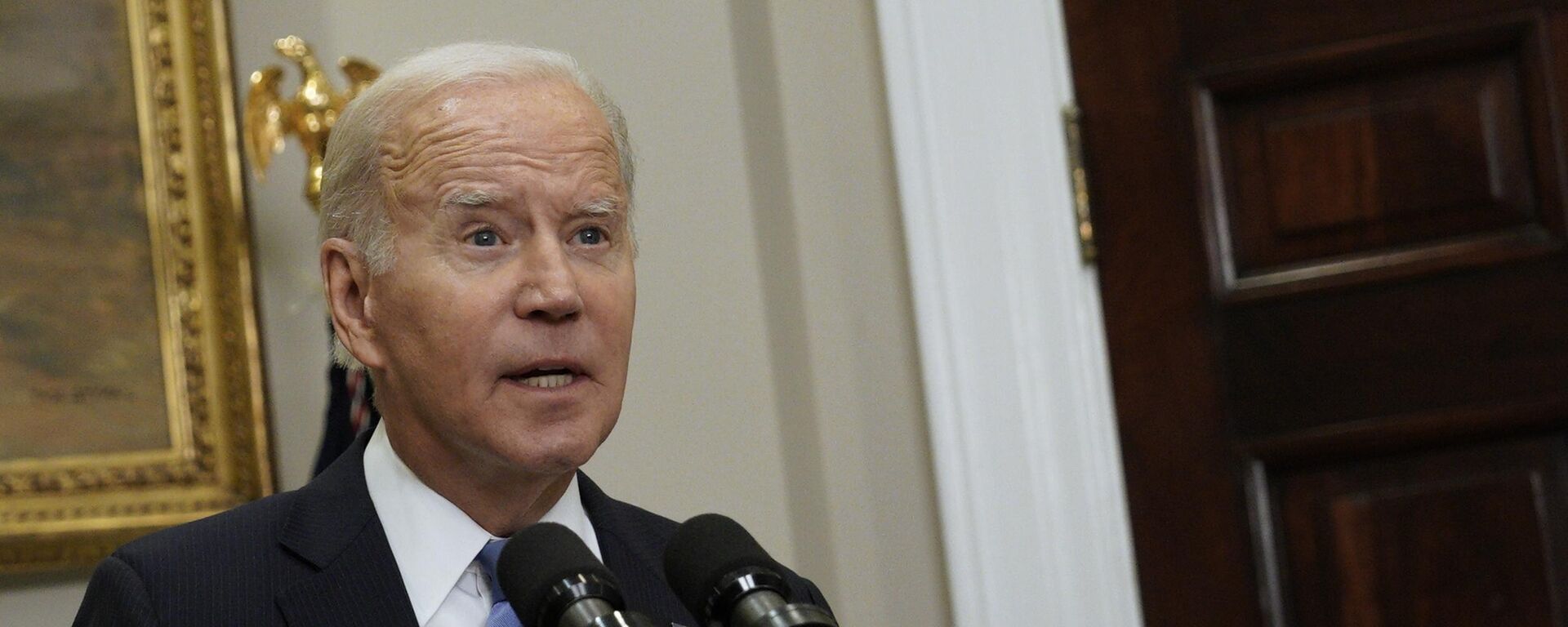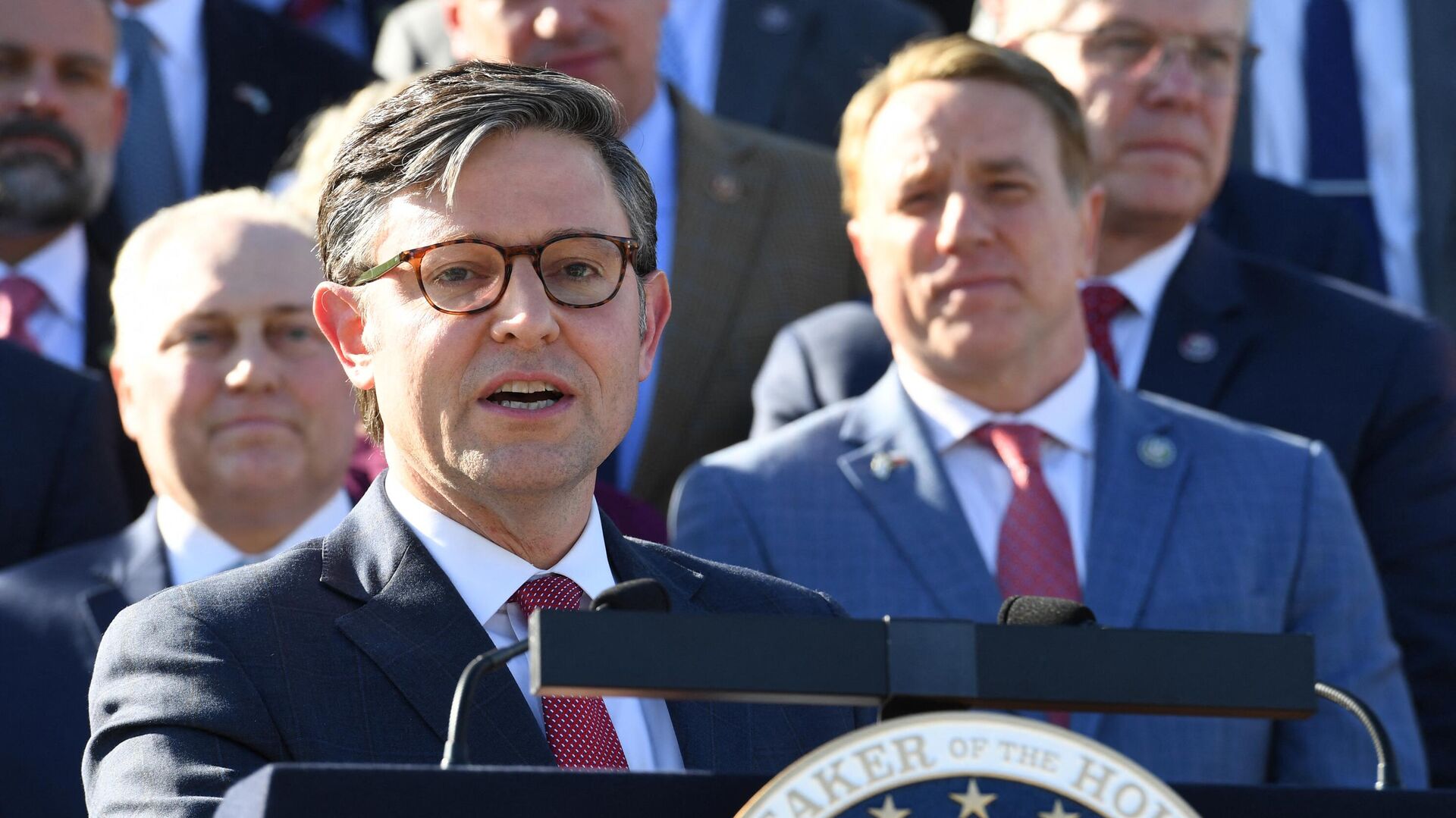https://sputnikglobe.com/20231102/new-house-speaker-growing-recognition-we-will-need-another-stopgap-funding-measure-1114673861.html
New House Speaker: ‘Growing Recognition We Will Need Another Stopgap Funding Measure’
New House Speaker: ‘Growing Recognition We Will Need Another Stopgap Funding Measure’
Sputnik International
House Speaker Mike Johnson admitted for the first time that Congress is unlikely to pass the essential funding bills it needs to in order to avoid a federal government shutdown, requiring a second interim funding bill.
2023-11-02T17:51+0000
2023-11-02T17:51+0000
2023-11-02T17:51+0000
americas
us
congress
republicans
mike johnson
house speaker
us budget
https://cdn1.img.sputnikglobe.com/img/07e7/0a/19/1114484683_0:0:2973:1672_1920x0_80_0_0_bcf3d48e8bb3ba07add3a0a006d63019.jpg
Asked about the possibility by reporters, Johnson said “it’s yet to be determined,” but noted that “everyone here recognizes, just because we’re running out of time, that we may not get all this done by November 17,” the day the previous continuing resolution, passed on September 30, expires.Johnson added that he wanted the bill to fund the federal government through January 15, but admitted the GOP would have to “build consensus” around that proposal, indicating it was not widely supported.According to reports, at a meeting earlier this week between Johnson and Senate Minority Leader Mitch McConnell (R-KY), who leads the Republicans in the Senate, he also floated the idea of an extension until March or April, pushing the highly political fight over spending levels to within months of the November 2024 elections. McConnell gave no indication of his thoughts at the closed-door conference, according to anonymous attendees who spoke with US media.Congress has a dozen major spending bills to pass that together constitute the 2024 budget. However, the level and recipients of that spending has been in even greater contention than normal, with not just Republicans and Democrats disagreeing with each other along party lines, but also dissent within the GOP ranks about not just spending priorities, but how much of a political fight the party should be willing to make over them.However, with the clock ticking on the 45-day funding extension, House Republicans, who command a very narrow majority, took three weeks to elect a replacement. With the chamber unable to continue with other business before electing a Speaker, the budget bills have remained in limbo.An added hurdle is the differing priorities of Johnson, a far-right stalwart of former US President Donald Trump, and McConnell, an old guard Republican. Johnson has insisted on separating a massive funding bill requested by the White House into a bill for Ukraine and another for Israel, while McConnell has sided with US President Joe Biden in insisting that the two countries receive aid from the same spending bill.Without either the budget bills or a stopgap funding measure passed by the deadline, many non-essential functions of the federal government will be forced to shut down, with thousands of employees furloughed without pay - a situation that could damage the US economy as well as Washington’s image internationally. After another high-stakes showdown over government spending ended in late May with an agreement possibly just days before the federal government would have been forced to default on its debt payments, international credit rating agency Moody’s downgraded the US’ credit rating.
https://sputnikglobe.com/20231026/biden-says-hopes-republicans-will-not-put-us-economy-at-risk-with-threats-of-shutdown-1114503908.html
americas
Sputnik International
feedback@sputniknews.com
+74956456601
MIA „Rossiya Segodnya“
2023
News
en_EN
Sputnik International
feedback@sputniknews.com
+74956456601
MIA „Rossiya Segodnya“
Sputnik International
feedback@sputniknews.com
+74956456601
MIA „Rossiya Segodnya“
house speaker; mike johnson; spending bills; 2024 budget; government shutdown; continuing resolution
house speaker; mike johnson; spending bills; 2024 budget; government shutdown; continuing resolution
New House Speaker: ‘Growing Recognition We Will Need Another Stopgap Funding Measure’
US House Speaker Mike Johnson (R-LA) admitted for the first time on Thursday that Congress is unlikely to pass the essential funding bills it needs to in order to avoid a federal government shutdown, requiring a second interim funding bill to be passed.
Asked about the possibility by reporters, Johnson said “it’s yet to be determined,” but noted that “everyone here recognizes, just because we’re running out of time, that we may not get all this done by November 17,” the day the previous continuing resolution, passed on September 30, expires.
“As quickly as we’re moving the appropriations bills here, the Senate’s a little behind, and obviously we have the conference committee process and all of that,” he said. “So, there’s a growing recognition that we are going to need another stopgap funding measure.”
Johnson added that he wanted the bill to fund the federal government through January 15, but admitted the GOP would have to “build consensus” around that proposal, indicating it was not widely supported.
According to reports, at a meeting earlier this week between Johnson and Senate Minority Leader Mitch McConnell (R-KY), who leads the Republicans in the Senate, he also floated the idea of an extension until March or April, pushing the highly political fight over spending levels to within months of the November 2024 elections. McConnell gave no indication of his thoughts at the closed-door conference, according to anonymous attendees who spoke with US media.

26 October 2023, 14:52 GMT
Congress has a dozen major spending bills to pass that together constitute the 2024 budget. However, the level and recipients of that spending has been in even greater contention than normal, with not just Republicans and Democrats disagreeing with each other along party lines, but also dissent within the GOP ranks about not just spending priorities, but how much of a political fight the party should be willing to make over them.
After then-House Speaker Kevin McCarthy (R-CA) decided to agree to the stopgap funding bill on September 30 instead of let the government shut down as an additional point of leverage on the Democrats, as some in his party had hoped, those dissidents moved to oust him from the leadership in a historic October 3 vote.
However, with the clock ticking on the 45-day funding extension, House Republicans, who command a very narrow majority, took three weeks to elect a replacement. With the chamber unable to continue with other business
before electing a Speaker, the budget bills have remained in limbo.
An added hurdle is the differing priorities of Johnson, a far-right stalwart of former US President Donald Trump, and McConnell, an old guard Republican. Johnson has insisted on separating a
massive funding bill requested by the White House into a bill for Ukraine and another for Israel, while McConnell has sided with US President Joe Biden in insisting that the two countries receive aid from the same spending bill.
According to US media reports on Thursday, Johnson has suggested to Senate Republicans that the two would be passed in quick succession, rather than drawing out debate on the more controversial Ukraine funding bill, in an attempt to win them over.
Without either the budget bills or a stopgap funding measure passed by the deadline, many non-essential functions of the federal government will be
forced to shut down, with thousands of employees furloughed without pay - a situation that could damage the US economy as well as Washington’s image internationally. After another high-stakes showdown over government spending ended in late May with an agreement possibly just days before the federal government would have been forced to default on its debt payments, international credit rating agency
Moody’s downgraded the US’ credit rating.



